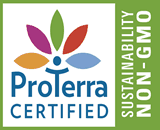
The ProTerra Standard is acknowledged as the B2B benchmark for social responsibility and environmental sustainability in the food industry.
FoodChain ID Certification was hired to carry out a feasibility study for the implementation of the Basel Criteria for Responsible Soy Production (2003/2004) against which 10 farms in Mato Grosso State, Brazil and another 10 in Paraná State, Brazil were verified with positive results. In addition to FoodChain ID Certification, the World Wildlife Fund (WWF), ProForest, and COOP Switzerland also participated in the initiative. The study resulted in the ProTerra Standard for Social Responsibility and Environmental Sustainability (2006) developed by FoodChain ID Certification.
In 2012, the ProTerra Standard moved from FoodChain ID Certification to the ProTerra Foundation, an independent non-profit organisation. Since becoming part of the ProTerra Foundation, adoption of ProTerra certification has grown strongly. The ProTerra Foundation regularly engages the stakeholder community and updates the Standard with the objective of promoting the sustainability of agricultural and food production systems.
The world has changed. Unlike a few years ago, consumers are well informed through 24-hour news media and social networking about sensitive issues such as deforestation, native population displacement and worker abuse. If the organisation cannot respond or issues are not effectively handled, consumers will instantly change their buying habits. Unwary commodity suppliers and supply chain players have been entangled in campaigns as diverse as:
- Indigenous population displacement in Brazil to make way for soy plantations
- Use of pesticides and air miles for cut flowers
- Over expansion of biofuels damaging to eco systems
- The Fish Fight – dabs become an overnight must have food
ProTerra is for all commodity crop producers, processors and end users. The Standard is applicable to all tiers of the supply chain, including primary production, processing, storage and distribution, and retail. The ProTerra Foundation assists organisations who wish to implement leading corporate social, ethical and environmental policies in their business. Policy engagement is recognized through independent certification to the ProTerra Standard to confidently communicate the firm’s commitment to consumers, retailers and investors.
ProTerra certification is applicable to any agricultural commodity in the world, including soy, sugarcane, maize, rice, sunflower, and rapeseed. Since its inception, over $10.5 billion worth of soybeans and soy products have been certified under the ProTerra Standard.
Based on the Basel criteria, developed by the WWF and COOP Switzerland, ProTerra is a certification standard which covers:
- Ethics and Social Responsibility
- Employment
- Health & Safety
- Welfare & Recruiting
- Training
- Environmental Sustainability
- Environmental Impact
- Genetic Modification
- Pollution & Waste Management
- Product Traceability
- Continuous Improvement
- Demand for sustainable products
- Competitive advantage in the market
- Low cost to certify vs. High added value
- More credibility to the company/cooperative/manufacturer
- Contributing to a more environmentally sustainable and responsible market
The ProTerra certification program for companies and cooperatives includes inspections of the producers who supply to them.
These inspections are determined after surveying the producers, who are classified according to the volume of production and delivery to the company. After that, a statistical stratified sampling is done, which is followed by a draw to select the producers to be audited.
In the case of producers who wish to obtain certification, audits are scheduled directly with them.
The ProTerra Standard is a recognized sustainability standard. Below are just a few of the reasons why you should choose ProTerra for your sustainability compliance requirements:
- ProTerra is an established and recognized sustainability standard
- ProTerra is applicable to any crop and is already a recognised leading standard for crops such as soya and sugar cane
- The ProTerra standard addresses all the relevant sustainability principles, including ethics, social responsibility and the environment
- FoodChain ID Certification is the recognized pioneer in non-GMO certification, a principle of the ProTerra standard
- FoodChain ID Certification has more than 15 years sustainability inspection and certification experience
- The ProTerra standard is regularly updated and current with industry standards for sustainability and social responsibility
- Bundled together, the FoodChain ID Non-GMO Global Standard verifies compliance to global regulatory requirements (e.g. the EU threshold of less than 0.1% EU authorised adventitious and technically unavoidable GM presence requirements)
- Traceability Certificates of Compliance (TCCs) are issued to batch/lot level for added confidence of conventional providence
- Customer satisfaction, close communication and continual improvement are FoodChain ID Certification’s top priorities
- FoodChain ID Certification ProTerra approved auditors have completed FoodChain ID Certification’s rigorous training program
- Quick delivery of certificates, helpful and well-mannered auditors and referral to trusted industry consultants are all part of FoodChain ID’s ProTerra service
- FoodChain ID Certification audits are carried out professionally by hand-picked, fully qualified, food industry experienced auditors
- FoodChain ID Certification audit reports and certificates are issued on time in order that you meet your customers’ requirements


